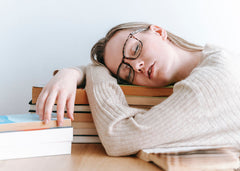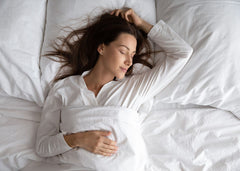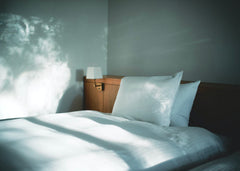Do women need more sleep than men? According to Professor Jim Horne from Loughborough University in the United Kingdom, women use their brains more than men, and as such they need to sleep for an average of 20 minutes more than men. But why?

A Busy Schedule
Women are far more likely to be multi-taskers than men. They can perform different tasks at the same time and are more flexible, consuming more energy in their brains than men do. Often, they have a busy and varied schedule, which may include running errands, taking care of children, and cooking in addition to working full time. As Professor Jim Horne explains, the more energy your brain uses during the day, the more time it needs to recover, and thus the more sleep you need. It’s no surprise that women need more sleep than men!
Hormonal Fluctuations
Hormones in our body also help explain why men and women require different amounts of sleep. Hormonal fluctuations are more common in women, especially during menopause, pregnancy and menstrual cycle. During these periods, the amount of progesterone in women will increase, making them feel sleepier during the day, and can also lead to physical discomfort and emotional fluctuations. As a result, women would require extra sleep to restore the energy used during hormonal fluctuations.

Why do women often don’t get enough sleep?
While women need more sleep than men, many of them are suffering from sleep deprivation and are unable to sleep well. Sleep deprivation is very common in women. One of the main reasons is that women go through many more hormonal changes than men, not only through their monthly cycles but also during pregnancy and menopause. These are all factors that affect the quality of sleep in women:
- Menstrual cycle:
Women often suffer from physical discomfort and pain (i.e. breast pain, stomach cramps and lower back pain), as well as emotional feelings during their monthly cycles, which can affect their quality of sleep.
- Pregnancy:
During pregnancy, women experience dramatic changes, both physically and emotionally, which can affect sleep quality. Whether it is anxiety about becoming a mum, the health of the baby, or fears about the delivery, all these worries can lead to insomnia. They may also find it difficult to sleep due to discomfort from movements of the baby inside and the added weight during pregnancy.
- Menopause:
Woman may experience difficulty sleeping due to hot flashes during menopause. These can interrupt sleep and lead to frequent wake-ups during the night, affecting sleep quality.
A woman's ability to multitask is one of the reasons why women need extra sleep, in order to recover the additional energy required for their brains to function well. At the same time, this also causes them to frequently experience poor sleep. Many women go to work during the day but return home to work even more, whether it’s taking care of the kids, preparing dinner or running errands, and as a result they often don’t get enough rest.
Solutions for a Better Night’s Sleep
Sleep is vital for everyone, and it is important to have enough sleep to stay in good health. Everyone knows that regular exercise provides many health benefits, such as weight control, reducing the likelihood of getting sick and improving sleep quality. However, do also try out these suggestions below for a good night’s sleep.
1. A Good Mattress
If your mattress doesn’t fit you well, or is starting to sag or wear out, then it’s time to consider changing your mattress. Chances are that your mattress may not be suitable for you if you start finding yourself tossing and turning all night long or waking up with body aches without any existing conditions. By switching to a good quality mattress, you are likely to instantly improve the quality of your sleep.

2. Colouring Books
The colouring book has become a popular way to reduce stress in recent years. By spending 15 to 30 minutes colouring at night before bed, our brains can slowly relax, reduce clutter, making it easier for us to fall into deep sleep.

3. Meditation
Meditation is an excellent tool to quieten the mind and allows you to sleep better throughout the night. Keep slow, steady breaths as you sit and meditate, and you will become aware of your breathing, body, thoughts, feelings and sensations as they rise and pass. Try meditating for five minutes at first, then gradually increase the volume and duration as you become more comfortable with the practice.

4. Yoga
Gentle yoga has a positive effect on sleep quality, helping you wind down after a long day. If you practice yoga on a regular basis, you are able to find it easily to fall asleep, sleep longer, and return to sleep more quickly even if you’ve woken up during the night. Check out these yoga poses that you can do before bed for a deep night’s sleep!
Conclusion
Research has shown that women require more sleep than men. Women are multi-taskers and go through more hormonal changes, so it’s no surprise why they need to sleep more. However, women are more likely to experience insomnia than men. If you’ve tried out our tips and still have trouble sleeping well, then consider consulting advice from a doctor.




